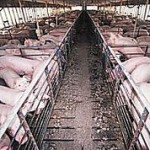For eons, the name “Smithfield” has conjured up rich, salty Virginia ham slices that fit right on Christmas rolls or in crab dishes and with eggs for breakfast. The company that has produced such food for 80 or so years is based (of course) in Smithfield, a quaint Tidewater town the Pagan River just off the James.
But as the food industry has become ultra-mechanized, so has Smithfield Foods’ problems. Back in the 1990s, it was fined $12.6 million for letting hog waste flow into the Pagan River. It later agreed to pay North Carolina $50 million over 25 years for problems at its Tar Heel, N.C. mega-plant.
Although Smithfield has cleaned up its act, or so we’re told, there is unsettling news that the firm will be bought for $4.7 billion by China’s Shuanghui International. If approved, the buyout will not result in moving the corporate HQ out of Smithfield or any firings, but that’s today’s news. As China’s middle class evolves, it tends to like pork products, and the demand to import ham and sausage is strong.
The worry is that you are selling off a major American food producer that has had serious health, environment and labor issues to a firm in China, a country that is notorious for its neglect of all of the above. Shanghai’s drinking water system was threatened a few months ago because the Whampoa River was crammed with diseased hog bodies. Standards are so low that the U.S. won’t let beef be exported, although we get a lot of our Tilapia from China.
The buyout would be the most significant yet for cash-flush Chinese firms and draws similarities to the massive buys Japanese firms made back in the 1980s.
Strict business types might still sound the usual upbeat mantra that China’s a huge market and yada, yada, yada, but I’ve been hearing that refrain since the days of Denh Xioaping. For realists, the bloom has been off as more evidence comes forward of cyber snooping, lax product safety standards and the utterly venal corruption of Communist Party hacks who still run the show.
Add to the this the idea that you may have gigantic American hog farms in the Southeast or Midwest churning out porkers for the Chinese and one wonders if the corrections taken for safety will remain in place. The hog farm concept sprang onto the scene in the 1990s when firms like Smithfield learned they could mass grow hogs in oppressively crowded conditions and dump their considerable fecal matter into huge ponds whose dams are prone to breaching.
The Raleigh News & Observer won a Pulitzer in the 1990s for alerting the country of what was going on.
Putting a known polluter under Chinese ownership does not sound like a great idea.



